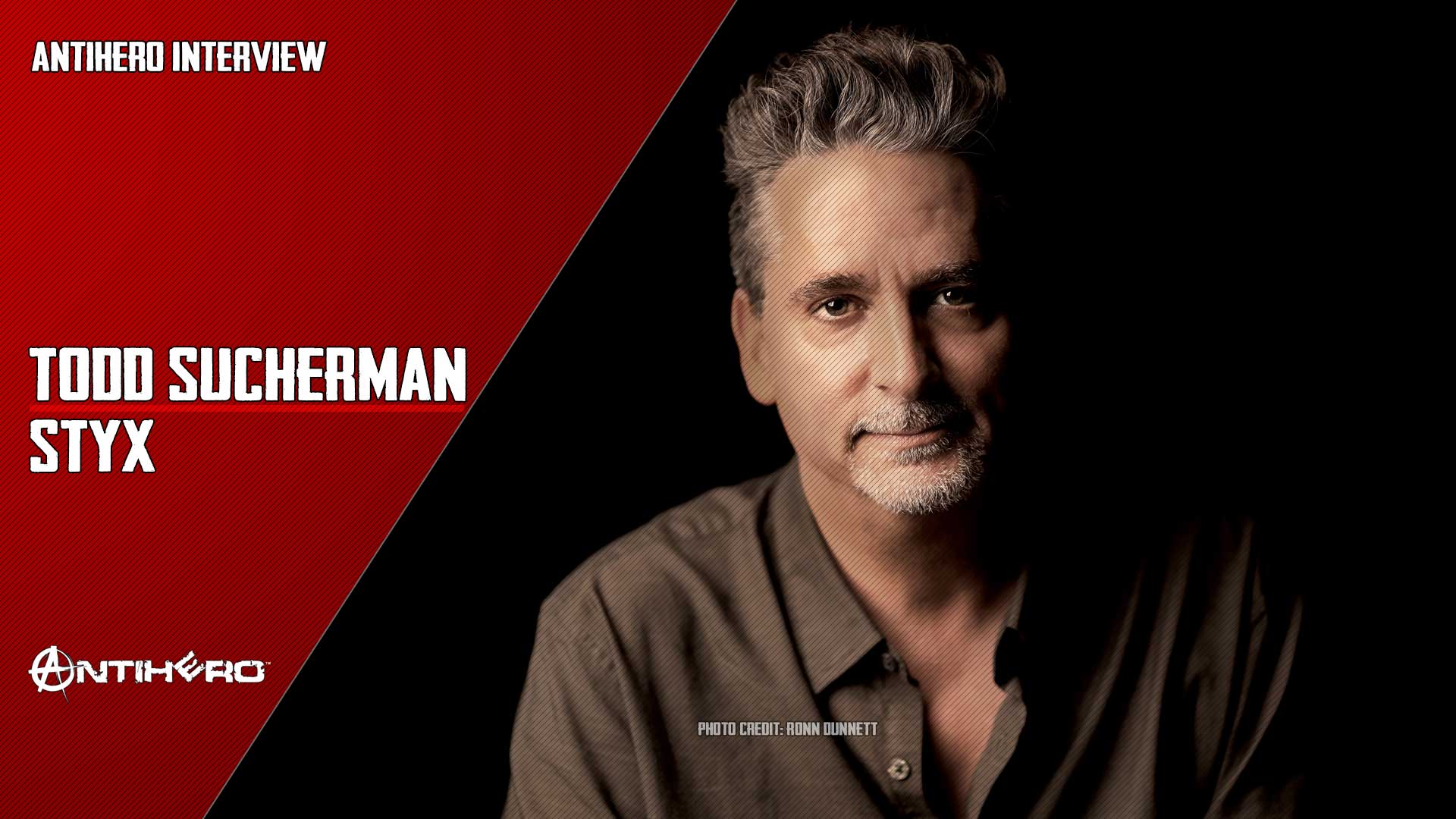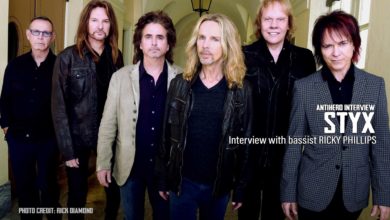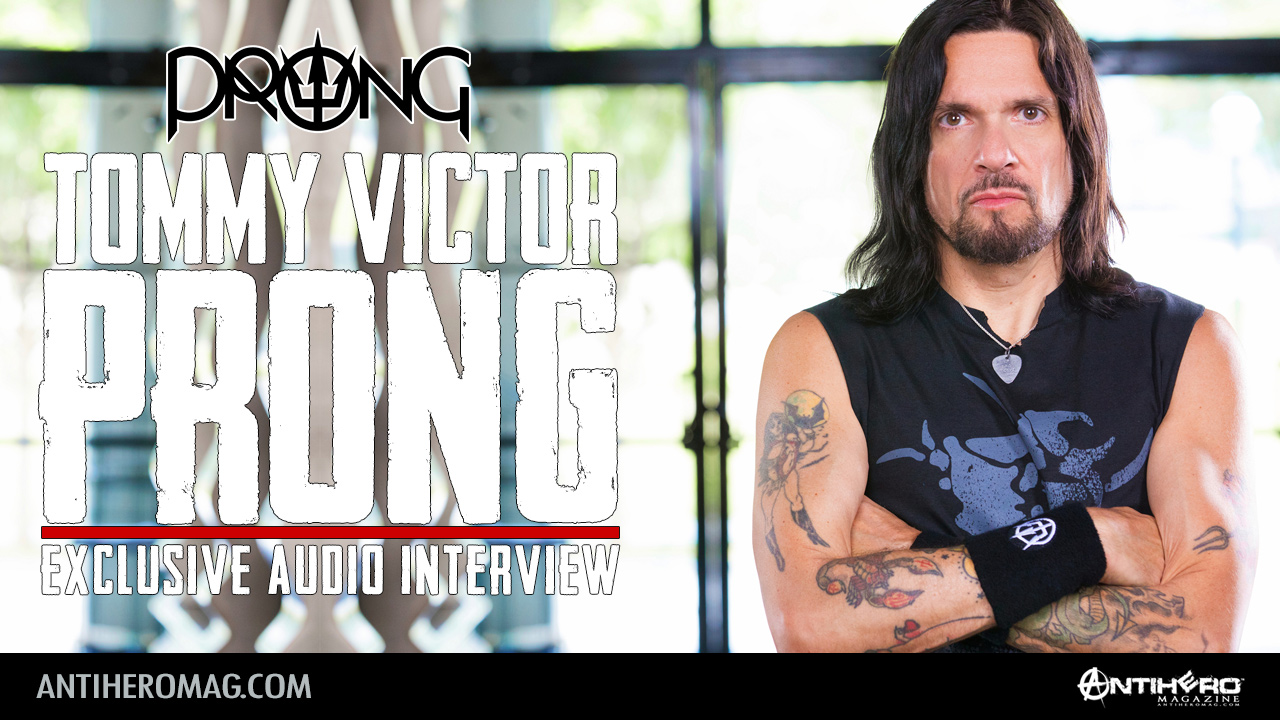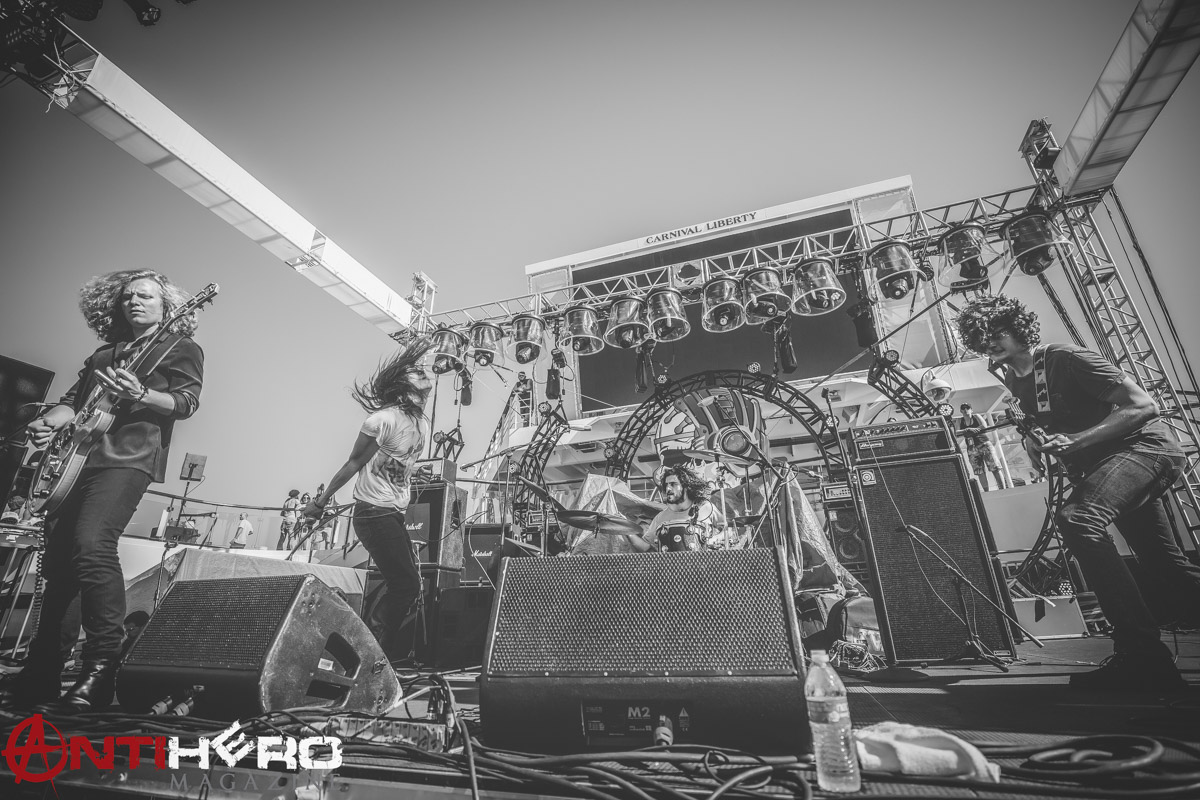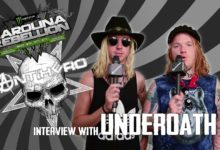“This was literally something I always dreamed of doing but didn’t know that I could do.” -Todd Sucherman
That’s Todd Sucherman, the widely acclaimed world-class drummer for Styx, explaining the impetus for cutting his first-ever solo album, Last Flight Home, that’s set for release via Aqua Pulse Records on May 2, 2020 (which also happens to be the man’s 51st birthday to boot).
— (excerpt from Todd Sucherman’s bio, by Mike Mettler)
We were afforded the opportunity to chat with the legendary Styxman, talk all things drumming, and explore his musical past, present, and future.
ANTIHERO: How are you?
Todd Sucherman: How are you doing, over there?
ANTIHERO: I’m good. I imagine it’s pretty much like the States, where everybody’s sort of house bound and, with no work.
Todd Sucherman: Yeah. It’s a peculiar thing, over here. I live in Austin, Texas, and they are trying to open up business. And I had to drop things off at the post yesterday, just in the box. In my estimation, there are way too many people, out and about.
ANTIHERO: It seems to be pretty much the same situation here. Generally, a lot of people just regard it as an extended summer vacation.
Todd Sucherman: It’s just, it’s really strange, over here. I think we’re going to see a spike in cases, over the next several weeks, here in Texas.
ANTIHERO: I think it’s going to be the same in the UK. Okay. Anyway, moving on. You’re about to release your first solo album, tomorrow. I just wonder, why has it taken you so long, to bring out a solo album?
Todd Sucherman: I think I’ve been so busy being on the road with Styx and being involved in many other musical or educational projects that it simply took this much time to actually happen. And I kept waiting, for some sort of inspiration to strike. I always imagined it would be some sort of jazz fusion project, as most people would, but having just played on Antoine Fafard’s, Bohemian Odyssey, which was a brilliant jazz fusion record that scratch was itched, for the time being. And an old buddy of mine, J.K. Harrison, had been trying to get me to do a record for quite some time. And things just sort of happened organically and naturally, and grew from there, after spending a couple of days in Los Angeles.
ANTIHERO: What about the songs then, themselves? Were they all pretty new songs or were they rather, a collection of songs that you’ve created over the years, and just been gathering dust?
Todd Sucherman: Well, a bunch of the songs had existed as either demos or sections, little bits, in J.K.’s writing arsenal, so we were able to put pieces together. I was able to go in, change melody lines, lyrics in some sections. Rhythmic parts, for a majority of them. The title track, Last Flight Home, we wrote together in about a half-hour. It was just one of those magical nights where it was lightning, back and forth. And before we knew it, we had a song that seemed to me to be a centerpiece or possibly track one, or possibly the album title. Which it ended up being.
ANTIHERO: Yeah. What was your primary drive then, for this release? Did you want to stay in the comfort zone of the style that you were known for, with Styx, or maybe actually challenge people’s perceptions, and do something completely different?
Todd Sucherman: No, this was actually a very terrifying notion for me, because I’ve always been very shy and sheepish about singing. I was quite comfortable to chime in on background vocals with a band like Styx, surrounded by incredible singers. But to step out and do this on my own, the fact that I was terrified and uncomfortable but somehow strangely excited by it, kind of made me feel like this is the place where I need to be. If I felt safe and secure, maybe that would be taking the easy route.
ANTIHERO: So, obviously then, did you feel any additional weight, or pressure, given that it was going to be your own name, on the album, and not Styx?
Todd Sucherman: Well, you’re making me feel it now.
ANTIHERO: Sorry about that…
Todd Sucherman: No, I just think, I’m enticed by the fact that it is not what most people would expect. And, with that notion in mind, there’s going to be people that are going to be pleasantly surprised and people that are going to be disappointed. If someone is hoping to hear Olympic drumming, this isn’t the record. Although, I play drums on every track, but it’s song supportive drumming, which is really my favorite kind of playing, anyway, rather than a constant barrage of, “Look at me, look at me, look at me,” type drumming. So, the response that I’ve gotten from those who have pre-ordered this has been really, really positive and heartwarming. And, they’re almost as surprised as I am.
ANTIHERO: Of course, there’s a track there, from the album, The Damage, which is something completely different as well.
Todd Sucherman: Oh, that. That’s sort of the hardest rocking song on the record. And one thing I like about some of my favorite records by other artists is, there’s a wide array of stories within the songs. And this is one of them, with The Damage, having lived in Los Angeles, I saw a lot of people who were talented but were social misfits. And would self-sabotage, and severely damage, any steps at all to get to their dreams. And therefore, it’s never happened. In that song, the character is a bit of a bastard, and womanizer and friendship betrayer. Untrustworthy. And then wonders, why his life is a wreck.
ANTIHERO: Did making this album actually teach you anything about yourself?
Todd Sucherman: Well, having been a professional musician since I was six years old, and never really singing, my respect and admiration for singers of all kinds has risen exponentially. Because, it is a very difficult task, to sing in time, to sing in tune, connect with each lyric and connect all the lyrics together, and present it as a story. That is a very challenging notion, indeed.
And I also was mindful that, as a drummer, there are certain drumming bits that I thought might be nice to have in there, but from the perspective of the singer, it distracted from the song. So, I played even more conservatively, to let the song come through as opposed to, “Oh, here’s a little moment in between a vocal line, I could put in a little clever bit right here.” That didn’t seem to serve the song, so I was more hyper-aware of what my role as a drummer should be, with these songs.
ANTIHERO: Obviously, all live shows around the world are obviously going to be on hold, for the foreseeable future. Just wondering if you had envisaged going out and performing some of these tracks off this new album, out live?
Todd Sucherman: I haven’t even considered that, at this point. This record was a grand experiment, to see if I could pull off something that I wasn’t sure that I could pull off. So just the fact that I got here, I’m just sort of taking it one day at a time. And with the current situation, when this will finally be behind us, I’m looking forward to getting out and playing live shows with the band. And I know that we’re going to have a good 60 or so dates, that we didn’t get to play this year that are going to have to move into future dates when it’s all clear.
So, that will really be the focus, at that point. And to expound upon that, I’ve never been able to plan or author or imagine the things that have happened to me, career-wise and musically, year by year. So I will just kind of take it day by day, and see what opportunities arise, and what feels right at the time.
ANTIHERO: With the launch of this album, do you feel then that you may become more involved in vocals with Styx? Maybe in terms of, the new tunes that the band are rumored to be working on, for the new album?
Todd Sucherman: Well, that remains to be seen. I know the songs are all written, and ready to go, and had COVID-19 not hit, I would have recorded all the drum tracks for the new record in Nashville, two weeks ago. That’s what I was scheduled to do.
I’ve always chimed in on some background vocals on various songs, through the years, and maybe that will increase a little bit. But it really is a difficult task to sing and play drums at the same time. It’s pretty much like being a circus performer, juggling a bowling ball and a chainsaw and something that’s on fire. That’s kind of how it feels, to play drums and sing at the same time.
ANTIHERO: Perhaps you should get some lessons maybe from Deen Castronovo?
Todd Sucherman: (laughing) Oh, Deen is an old pal of mine yet. Yeah, I know, he’s quite a master at that, indeed.
ANTIHERO: Just moving on then, with a few more general questions. I just wondered, were you a fan of Styx, before you actually joined the band?
Todd Sucherman: Yes. Growing up in Chicago, they were a hometown favorite, so they were on the radio frequently. I grew up the youngest in a musical family, so there was a wide variety of musical tastes, always blaring from someone’s bedroom or the living room. But Styx was definitely in the wheelhouse. We had the records, I saw them in 1981 when I was… Boy, I was about 11 or so. And saw them again, in 1983. So yeah, I could never have imagined ending up playing with the band. Much less, being in the band for the last 24 years.
ANTIHERO: Was there anything about John Panozzo’s playing on the albums that surprised you, or you didn’t expect, when you prepared to join the band? Obviously, you would have had to go back and check out the earlier albums.
Todd Sucherman: Yeah. I was in various rock bands that played Styx material, so I was very aware of the material. So, it was already part of my musical DNA, so to speak. One interesting thing about John’s drumming is, he was a very unorthodox drummer, insofar as, he played on the busy side for someone who didn’t have a lot of technique. And I don’t mean that, and I don’t mean any disrespect, with that. It’s sort of like one step towards that Keith Moon type of territory, where there are some interesting fills that happened, in peculiar places. And crash cymbal explosions, in unique places. He played in a very unorthodox, interesting style. So those were fun templates for me to work from, and try to do my own thing with it, but still keep the essence and the flavor of what came before.
ANTIHERO: Just checking your CV there, earlier today, before this chat. I was surprised to see you listed as a musician, on the Spinal Tap album. Can you tell me about your involvement with them?
Todd Sucherman: Yes. I played with Spinal Tap on a few late-night talk shows, here in America. I did The Tonight Show with them, in 2000. And in 2009, I played Jimmy Fallon and the Jon Stewart Daily Show, with those guys. And I played two songs on Derek Small’s solo record, which came out last year.
ANTIHERO: Going back then, to examine your initial influences, as a drummer, would that have been your father? Or perhaps, somebody else as well as your father? Because, obviously, your father played drums.
Todd Sucherman: Yeah. My father was a drummer at night, and a doctor by day. And he was a big band jazz drummer. So, one of the greatest cards I was dealt was being the youngest in a musical family. My mother was an actress who could sing and play piano. My older brothers played piano and played bass, and I fell in love with the drums, while I was still a baby. As an infant, really. I’ve been playing since I was two years old, and it’s all I’ve ever wanted to do. So, I also rounded out the rhythm section. So we grew up playing piano, bass, drums, and full rhythm section, under the tutelage of my father. And it was just a marvelous way to grow up.
ANTIHERO: Just wondering if you have any tips for any new drummers, people aspiring to be as precise and as musical as you are in your playing. What sort of tips would you give them?
Todd Sucherman: Learn as much as you can, and be prepared to play many different styles. If you have the versatility to your musicianship, you can keep your schedule busy, as a working musician. That’s what I groomed myself to be. So, when I was coming up in the ranks in Chicago, 19, 20, 21, 22 years old, I was playing in bebop jazz quintets, I was playing a 13 piece salsa, samba Latin band. I was in various rock projects, trying to get record deals. I was playing in other jazz fusion projects, and I was playing in corporate bands and wedding bands.
And because I was versatile, I kept my schedule very, very busy and was a successful working musician in Chicago. Then, I met other players that were in the recording session scene in Chicago, and I was able to infiltrate that scene. And that’s where the real money was, back in those days.
So, if you want to be a working musician, that’s how you should go about your craft. If you want to be a rockstar, that is a very different set of things you have to go through. And if, you’re basically buying a lottery ticket. You have just as much chance of winning the lottery, as becoming a rock star. But I was never interested in that. I wanted to be a working musician. I never wanted to have to tar a roof, or dig a hole or flip burgers. This is what I wanted to do, and I had no backup plan. It was ‘sink or swim’, and I made sure that I swam.
ANTIHERO: Do you still practice? Or are you comfortable within your own abilities?
Todd Sucherman: Absolutely. I try to… I’m not always successful with doing it, but I try to get in at least a half-hour a day because you have a relationship with your instrument. And you have to keep that relationship finely tuned. If I don’t touch the drums for several days, I really feel it, the next time I go back. As long as I’ve been doing this.
And the older you get, the harder it is to maintain that edge. So that’s one of the things I’m trying to concentrate, during this long hiatus that we have here, is that I keep my skills sharp. I’m maintaining them, I’m working on new ideas so that when I do go back to work, I don’t feel like I’m 90 years old on that first show.
ANTIHERO: When you’re creating music with Styx, and they bring a new song to the band, what’s your approach in finding your parts to the song? Do you reconstruct sections, to suit a drumming phase that you would like to include, or just play off the head and see what fits the actual song?
Todd Sucherman: Well, it’s quite different now. When we did Cyclorama, in 2003, we were all five guys in a room looking at each other and coming up with things together. For The Mission, and this new one, Tommy has written demos. Complete program, drum guides. But those are just guides. Sometimes I go, “Well that’s the perfect bass drum and snare drum pattern, for this.” But they give me the freedom to do my own fills, or if I have a better idea, it’s always entertained. So that’s how it was for The Mission, and that’s how it’s going to go, when we get in the studio to record this next one. Which the music for this upcoming record is just, unbelievable. I cannot wait to get to work on that.
ANTIHERO: Just a couple then, to finish. Do you have any interests, or hobbies, outside music? Something maybe that fires you up as much as drumming clearly does.
Todd Sucherman: I collect drums, but I collect drums that I want. It’s not about quantity, it’s about the specific choices. So, I’m a bit of a gear head, in that regard. I love cooking and I love quality cinema and television shows. And, some spirits and some couch time, with my wife. And then, in the daytime, playing with my daughter. Nothing chips into your free time, quite like having kids, but it does work in a delightful way.
And, after 24 years straight on the road, I’m happy to say that I’m managing this home time quite easily, with my wife and daughter. It’s a nice break that will probably never happen again, so I’m trying to extract all the positives that I can, through this particular situation we’re in.
ANTIHERO: Okay. Just a final one. If you could play with any other band over the years, and replace the drummer, would there be any particular band that would stand out?
Todd Sucherman: That would be, probably a three-way tie between The Who, Genesis, and Peter Gabriel.
ANTIHERO: That’s great. Thank you very much. And happy birthday, for tomorrow.
Todd Sucherman: Oh, thank you, Mark. I appreciate that.
ANTIHERO: Cheers, Todd. Thank you very much, for chatting to me.
Todd Sucherman: It’s a pleasure, man. You stay safe over there, okay?

